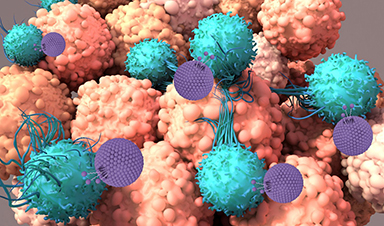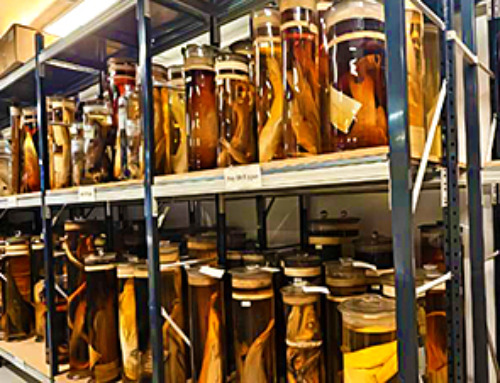| Scientists of the department of Advanced Organ Bioengineering and Therapeutics (TechMed Centre) recently published a novel cancer immune therapy in the scientific journal Nature Communications (“Cancer immune therapy using engineered ‛tail-flipping’ nanoliposomes targeting alternatively activated macrophages”). | |
| In their research, Prof Dr Jai Prakash and his team developed newly designed nanoparticles which can target the body’s immune cells to turn them against cancer. | |
| In cancer research, it has been increasingly known that tumour cells can change the alliance of some specific macrophages to help the tumour grow. “Macrophages are cells that act like the vacuum cleaners of your immune system. Normally they catch intruders and destroy them, but tumour cells can hijack these cells to help them spread throughout the body,” Prakash explains. | |
Tail-flipping nanoparticles |
|
| Prakash and his team designed nanoparticles that train these tumour-supporting ‘bad’ macrophages into cells that will fight tumours. However, these tiny (100-200 nanometre diameter) cell-like structures first have to find the macrophages before they can start the training. Prakash says: “It was one of the questions we tried to answer with this research: How do we get our nanoparticles at the right location and to the right macrophage.” | |
| To solve this challenge, the researchers had to alter the nanoparticles. The nanoparticles consist of a double layer of specific lipids (phospholipids) called nanoliposomes. These lipids have long tails that like to stick together in between the double layer. “We replaced some of the lipids to ones with a slightly shorter charged tail that can ‘flip’ to the outer surface,” Prakash explains. The bad macrophages can recognize these flipped tails and then eat up the whole particle. | |
Training macrophages |
|
| “When we knew how to target the bad macrophages, it became time to train them into fighting the tumour again”, Prakash says. The researchers added a small component of the bacterial cell wall, which can train macrophages, to the ‘tail-flipping’ nanoliposomes in the double layer wall of these nanoparticles. These molecules are then also taken up by the bad macrophages which subsequently train them to kill cancer cells. Targeting this compound this way prevents it from being recognized by the wrong cells and thus prevents damage to other parts of the body. | |
Killing tumors and preventing metastasis |
|
| In the publication, the researchers not only show that the hijacked macrophages can be retrained to fight the cancer cells again, inhibiting the tumour growth by 70% in breast tumour mouse models. “In our mice, the therapy prevented metastasis, the ability of cancer cells to spread through the body,” Prakash says. The trained macrophages prevented the tumour cells from ‘preparing’ lung tissue to host tumour cells – a process before metastasis. When a tumour cell arrived in the lungs, the tissue wasn’t ready and the tumour cell couldn’t start a new tumour. |
News
Scientists Find Way to Turn Tumor-Protecting Cells Into Cancer Killers
A new cancer therapy wakes up immune cells inside tumors and turns them against cancer. Tumors contain immune cells called macrophages that are naturally capable of attacking cancer. However, the tumor environment blocks these [...]
Analyzing Darwin’s specimens without opening 200-year-old jars
Scientists have successfully analyzed Charles Darwin's original specimens from his HMS Beagle voyage (1831 to 1836) to the Galapagos Islands. Remarkably, the specimens have been analyzed without opening their 200-year-old preservation jars. Examining 46 [...]
Scientists discover natural ‘brake’ that could stop harmful inflammation
Researchers at University College London (UCL) have uncovered a key mechanism that helps the body switch off inflammation—a breakthrough that could lead to new treatments for chronic diseases affecting millions worldwide. Inflammation is the [...]
A Forgotten Molecule Could Revive Failing Antifungal Drugs and Save Millions of Lives
Scientists have uncovered a way to make existing antifungal drugs work again against deadly, drug-resistant fungi. Fungal infections claim millions of lives worldwide each year, and current medical treatments are failing to keep pace. [...]
Scientists Trap Thyme’s Healing Power in Tiny Capsules
A new micro-encapsulation breakthrough could turn thyme’s powerful health benefits into safer, smarter nanodoses. Thyme extract is often praised for its wide range of health benefits, giving it a reputation as a natural medicinal [...]
Scientists Develop Spray-On Powder That Instantly Seals Life-Threatening Wounds
KAIST scientists have created a fast-acting, stable powder hemostat that stops bleeding in one second and could significantly improve survival in combat and emergency medicine. Severe blood loss remains the primary cause of death from [...]
Oceans Are Struggling To Absorb Carbon As Microplastics Flood Their Waters
New research points to an unexpected way plastic pollution may be influencing Earth’s climate system. A recent study suggests that microscopic plastic pollution is reducing the ocean’s capacity to take in carbon dioxide, a [...]
Molecular Manufacturing: The Future of Nanomedicine – New book from Frank Boehm
This book explores the revolutionary potential of atomically precise manufacturing technologies to transform global healthcare, as well as practically every other sector across society. This forward-thinking volume examines how envisaged Factory@Home systems might enable the cost-effective [...]
New Book! NanoMedical Brain/Cloud Interface – Explorations and Implications
New book from Frank Boehm, NanoappsMedical Inc Founder: This book explores the future hypothetical possibility that the cerebral cortex of the human brain might be seamlessly, safely, and securely connected with the Cloud via [...]
Global Health Care Equivalency in the Age of Nanotechnology, Nanomedicine and Artificial Intelligence
A new book by Frank Boehm, NanoappsMedical Inc. Founder. This groundbreaking volume explores the vision of a Global Health Care Equivalency (GHCE) system powered by artificial intelligence and quantum computing technologies, operating on secure [...]
Miller School Researchers Pioneer Nanovanilloid-Based Brain Cooling for Traumatic Injury
A multidisciplinary team at the University of Miami Miller School of Medicine has developed a breakthrough nanodrug platform that may prove beneficial for rapid, targeted therapeutic hypothermia after traumatic brain injury (TBI). Their work, published in ACS [...]
COVID-19 still claims more than 100,000 US lives each year
Centers for Disease Control and Prevention researchers report national estimates of 43.6 million COVID-19-associated illnesses and 101,300 deaths in the US during October 2022 to September 2023, plus 33.0 million illnesses and 100,800 deaths [...]
Nanomedicine in 2026: Experts Predict the Year Ahead
Progress in nanomedicine is almost as fast as the science is small. Over the last year, we've seen an abundance of headlines covering medical R&D at the nanoscale: polymer-coated nanoparticles targeting ovarian cancer, Albumin recruiting nanoparticles for [...]
Lipid nanoparticles could unlock access for millions of autoimmune patients
Capstan Therapeutics scientists demonstrate that lipid nanoparticles can engineer CAR T cells within the body without laboratory cell manufacturing and ex vivo expansion. The method using targeted lipid nanoparticles (tLNPs) is designed to deliver [...]
The Brain’s Strange Way of Computing Could Explain Consciousness
Consciousness may emerge not from code, but from the way living brains physically compute. Discussions about consciousness often stall between two deeply rooted viewpoints. One is computational functionalism, which holds that cognition can be [...]
First breathing ‘lung-on-chip’ developed using genetically identical cells
Researchers at the Francis Crick Institute and AlveoliX have developed the first human lung-on-chip model using stem cells taken from only one person. These chips simulate breathing motions and lung disease in an individual, [...]





















